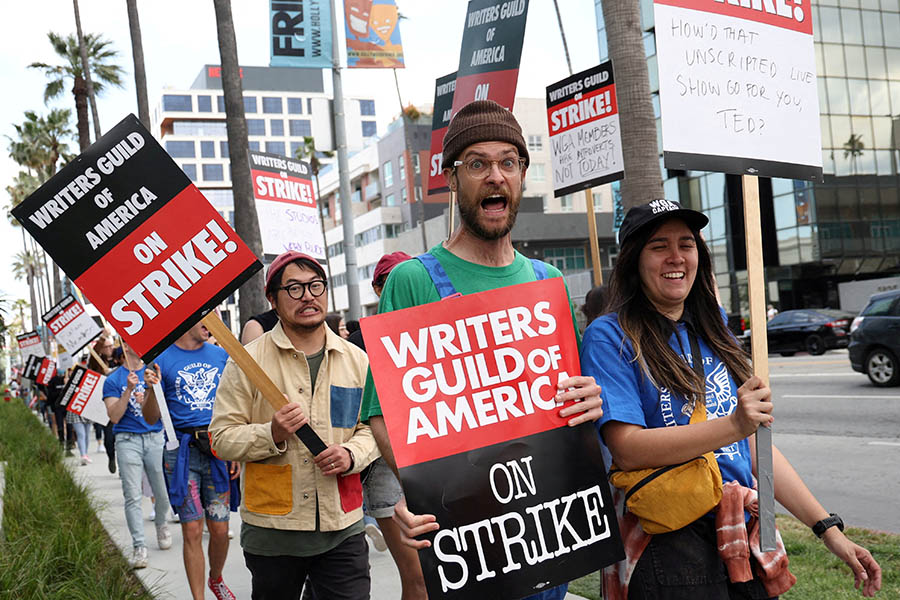After 146 days on strike, the Writers Guild of America — the labor union representing film, television, radio and online media writers — reached a tentative deal Sept. 24 with the Alliance of Motion Picture and Television Producers, or AMPTP, the organization that negotiates on behalf of Hollywood’s largest production companies.
While the end of both bicoastal WGA picket lines and talk show reruns is now in sight, the agreement is also significant owing to indications it contains landmark labor protections critical in a rapidly evolving digital entertainment age.
The new WGA-AMPTP contract apparently delivers to WGA most of what it wanted — including increased royalty payments for streaming content and assurances the use of artificial intelligence, or AI, won’t impact writers’ content and compensation. Both issues — which swiftly developed since the previous 2020 contract — were key to strikers’ demands.
The WGA told members there is “an agreement in principle on all deal points, subject to drafting final contract language.”

However, the actors’ union SAG-AFTRA — the Screen Actors Guild-American Federation of Television and Radio Artists — remains on strike. Its members are asking for — among other demands — 2 percent of total revenue from streaming shows; protection from unapproved and unpaid AI digital replicas of their likenesses; and guarantees against AI alterations of their performances.
Similarly, when the WGA went on strike May 2 for the first time in 15 years, representatives for its 11,500 members stipulated to AMPTP that any forthcoming contract agreement should “regulate use of material produced using artificial intelligence or similar technologies.”
“We can say, with great pride, that this deal is exceptional — with meaningful gains and protections in every sector of the membership,” the WGA Negotiating Committee said in a statement.
The committee praised the tenacity of its members, declaring, “What we have won in this contract … is due to the willingness of this membership to exercise its power, to demonstrate its solidarity, to walk side-by-side, to endure the pain and uncertainty of the past 146 days. It is the leverage generated by your strike, in concert with the extraordinary support of our union siblings, that finally brought the companies back to the table to make a deal.”
“They were always going to reach an agreement,” explained Miranda Banks, an associate professor and chair of film, television and media studies at Loyola Marymount University’s School of Film and Television in Los Angeles. “They are not going to shut down the entire industry. … But ultimately, any deal is going to be a negotiation — so both sides will have had to have made concessions.”
Banks told OSV News that, by its very nature, the commerce of entertainment is changing.
“The industry has so radically transformed — in the last five years, 10 years, 20 years — that in some ways,” she said, “there’s no turning back the dial.”
A Memorandum of Agreement will next be completed with AMPTP, after which the WGA Negotiating Committee will vote whether to recommend and send it for board and council approval. Their vote will authorize a contract ratification vote by WGA membership — an outcome that may be none too soon.
As Deadline Hollywood reported in July, it was anticipated most WGA members would be “running out of money after five months on the picket line and no work. ‘The endgame is to allow things to drag on until union members start losing their apartments and losing their houses,’ a studio executive told Deadline … several other sources reiterated the statement. One insider called it ‘a cruel but necessary evil.’”
Public reaction was swift and harsh, with studio executives quickly cast as villains.
“The comments that were made in July were extremely damaging,” Banks said, “both in terms of the timing of the comments, but also in the kind of ‘let them eat cake’ mentality. It seemed to show a lack of respect and concern for media workers.”
Writers could ostensibly return to work — even pending the new contract ratification vote — once the WGA board and council vote to lift a restraining order and end the strike at a specific date and time.
However, as Banks pointed out, they can’t go back on production sets while SAG-AFTRA is still on strike.
“They’re not going to cross a picket line and the actors are picketing,” Banks explained. “So they’ll be able to work, but they’ll work remotely. The hope is that actors will be able to start their negotiations as soon as the (WGA-AMPTP) paperwork is complete.”
“The Catholic Labor Network is pleased to see that the writers have reached a tentative contract,” Clayton Sinyai, CLN’s executive director told OSV News, “and hope that their peers in SAG-AFTRA will shortly achieve the same.”
The Catholic Church has an extensive history of teaching and actions supporting the rights of workers, and both popes and prelates have spoken directly to the issue of unions and strikes.
Pope Francis has said “there are no free workers without trade unions.”
St. John Paul II also stated in his 1981 encyclical “Laborem Exercens” that “workers should be assured the right to strike, without being subjected to personal penal sanctions for taking part in a strike.”
The U.S. Conference of Catholic Bishops’ 1986 pastoral letter “Economic Justice for All” teaches, “Unions may also legitimately resort to strikes where this is the only available means to the justice owed workers.”
More recently, Archbishop Borys Gudziak of the Ukrainian Catholic Archeparchy of Philadelphia, chairman of the USCCB’s Committee on Domestic Justice and Human Development, said in a Labor Day statement released Aug. 30 that labor unions are “essential” to the thriving of working families.
“It’s just the foundational idea that workers must be foregrounded in businesses’ estimation of thinking about their use of labor,” Daniel Graff, director of the Higgins Labor Program at the University of Notre Dame’s Center for Social Concerns, told OSV News. “Workers’ interests and workers’ inherent dignity is something that needs to be considered — and at the same time, the commitment to workers having a voice in the process.”
While specifics of the WGA-AMPTP agreement are as yet undisclosed, “someone using a Catholic social teaching angle would say, this looks like success,” Graff observed. “It’s not about saying what the outcome necessarily is — it’s about the process. And collective bargaining in this case has afforded the means and the mechanisms by which the determination of a just wage is made,” he said.
Read More Movies & Television
Copyright © 2023 OSV News





